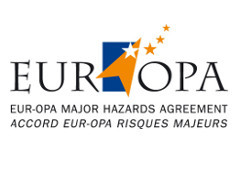Migrants
Civil protection in diverse societies:
migrants, asylum seekers and refugees in the context of major risks prevention and management
12-13 June 2014, Council of Europe, Strasbourg



Presentations
- Mr Christian HANNIG, Ernst-Moritz-Arndt-University, Greifswald, Germany
Civil Protection in European multicultural societies – starting points for practise and development
- Ms Biljana MARKOVA, Regional Office for Europe, UNISDR, Brussels, Belgium
UNISDR Making Cities Resilient Campaign
- Mr Akiyoshi KIKUCHI, Sendai International Relations Association, Japan
- Mr Samir HUSEINBASIC, Head of Department for the structure and training, Protection and Rescue Sector, Ministry of Security of Bosnia and Herzegovina
Lessons learned from the recent floods in Bosnia and Herzegovina
- Mr David MARTIN ABANADES, Deputy Chief Fuenlabrada Police Service, Fuenlabrada, Spain
The role of the police: work of the Diversity Management Team
- Ms Isabel PIMENTEL, Civil Protection Technician, Lisbon, Portugal
Emergency Planning related to vulnerable groups
- Mr Hervé BIGORNE, National Federation of Civil Protection, Bas-Rhin, France
Competences and means of Civil Protection available when a major hazard occurs
- Mr Malte SCHÖNEFELD, M.A., Ernst-Moritz-Arndt-University, Greifswald, Germany
- Prof. Dr. Bernd MUELLER-JACQUIER, Bayreuth, Germany
Emergency Communication and Conversation Analysis
- Mr Mag. Phil. Robert ROZINSKY and Dr. Bruno NESTLER, Language Institute, Austrian Armed Forces, Vienna, Austria
Security and Plurilinguism (part 1)
Security and plurilinguism (part 2)
- PD Dr. Elke M. GEENEN, ISOKIA, Germany
- Dr. Alexandre REMAÎTRE, University of Strasbourg, CERG, Strasbourg, France
Emergency preparedness tools for geohazards: earthquakes, landslides and floods
- Prof. Dr. Stephanos E. DRITSOS, University of Patras, Greece
Development of information documents in emergency management, e.g. in the field of earthquakes
- Ms Claudia SCHEDLICH, German Federal Office of Civil Protection and Disaster Assistance (BBK), Bonn, Germany
Psychosocial Crisis Management in CBRN incidents – be prepared to cultural challenges
- Mr Yoshihiko DOI, NPO Resource Centre for Multicultural Community Tokai, Japan
- Mr Georgi PETROV, DG Fire Safety and Civil Protection, Ministry of Interior, Bulgaria
Bulgaria Response and Assistance to the Republic of Serbia during the 2014 floods



